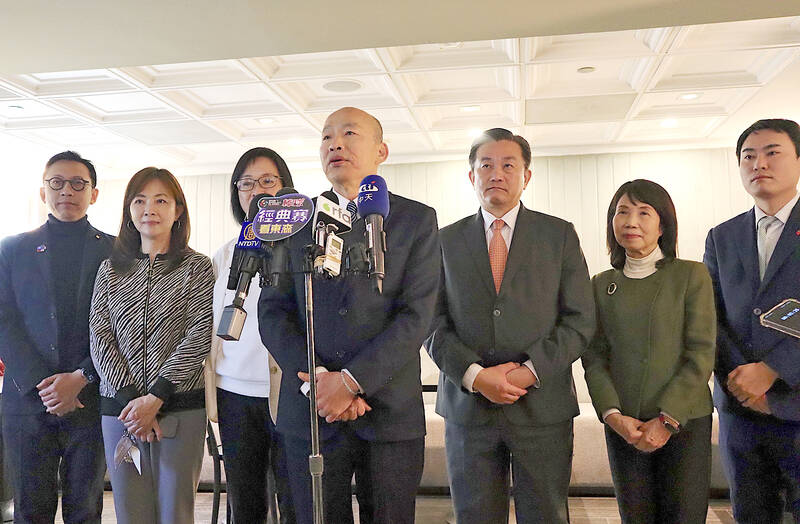Legislative Speaker Han Kuo-yu (韓國瑜) on Wednesday said that his cross-party delegation to the US has maintained unity and was pleased to see bipartisan support for Taiwan among members of the US Congress.
Speaking to Taiwanese reporters the day before the delegation’s four-day visit ended, Han said some Taiwanese expatriates were worried about whether he and his delegation would be able to watch the inauguration of US President Donald Trump, as the Monday ceremony had been moved indoors because of cold weather.
Due to space limitations in the Capitol Rotunda where the ceremony was held, the Taiwanese delegation could not attend in person, but the members were able to watch on large screens at nearby locations, Han said.

Photo: CNA
Han said he and Representative to the US Alexander Yui (俞大?) joined other guests at the Capitol Visitor Center, called Emancipation Hall, to watch the inauguration ceremony on a large screen.
The other members of the Taiwanese delegation — seven cross-party lawmakers — watched a livestream in a VIP area of the Capital One Arena, just over a mile from the Capitol Building, Han said.
Those arrangements were made through the efforts of the Ministry of Foreign Affairs and its representative office in the US, he added.
After Trump’s swearing-in ceremony, he went to Emancipation Hall to give a short speech, Han said, adding that he and Yu were standing no more than 25m away from the US president.
While in Washington, Han said that his delegation met with a number of Trump administration officials in charge of Taiwan and Asian affairs.
The delegation also visited think tanks affiliated with the Democratic and Republican parties to discuss Taiwan-US relations and future bilateral cooperation, Han said.
The discussions covered areas such as security, technology, business, education and culture, he said.
“All the members of the delegation feel that there is strong bipartisan support in the US Congress for Taiwan,” Han said.
According to Taiwan’s representative office in the US, the delegation met with 24 members of the US Congress in total, including Ted Cruz, chairman of the Senate Committee on Commerce, Science and Transportation; and Michael McCaul, chairman of the House Foreign Affairs Committee.
Meanwhile, Han said that the exchanges among the eight members of his cross-party delegation remained cordial throughout the trip.
Han said he and the seven other lawmakers from three different parties presented a unified front in pushing for closer Taiwan-US exchanges.
The delegation comprised Han of the main opposition Chinese Nationalist Party (KMT); lawmakers Wang Ting-yu (王定宇), Chen Kuan-ting (陳冠廷) and Jean Kuo (郭昱晴) of the ruling Democratic Progressive Party; Ko Chih-en (柯志恩), Lee Yen-hsiu (李彥秀) and Ko Ju-chun (葛如鈞) of the KMT; and Chen Gau-tzu (陳昭姿) of the smaller opposition Taiwan People’s Party.
They all expressed the wish that the unity among themselves could be maintained when they return to Taiwan, where their parties have been wrangling in the legislature for months over various issues.
The delegation was scheduled to depart from the US late yesterday and arrive in Taiwan the following day.

Taipei, New Taipei City, Keelung and Taoyuan would issue a decision at 8pm on whether to cancel work and school tomorrow due to forecasted heavy rain, Keelung Mayor Hsieh Kuo-liang (謝國樑) said today. Hsieh told reporters that absent some pressing reason, the four northern cities would announce the decision jointly at 8pm. Keelung is expected to receive between 300mm and 490mm of rain in the period from 2pm today through 2pm tomorrow, Central Weather Administration data showed. Keelung City Government regulations stipulate that school and work can be canceled if rain totals in mountainous or low-elevation areas are forecast to exceed 350mm in

EVA Airways president Sun Chia-ming (孫嘉明) and other senior executives yesterday bowed in apology over the death of a flight attendant, saying the company has begun improving its health-reporting, review and work coordination mechanisms. “We promise to handle this matter with the utmost responsibility to ensure safer and healthier working conditions for all EVA Air employees,” Sun said. The flight attendant, a woman surnamed Sun (孫), died on Friday last week of undisclosed causes shortly after returning from a work assignment in Milan, Italy, the airline said. Chinese-language media reported that the woman fell ill working on a Taipei-to-Milan flight on Sept. 22

COUNTERMEASURE: Taiwan was to implement controls for 47 tech products bound for South Africa after the latter downgraded and renamed Taipei’s ‘de facto’ offices The Ministry of Foreign Affairs is still reviewing a new agreement proposed by the South African government last month to regulate the status of reciprocal representative offices, Minister of Foreign Affairs Lin Chia-lung (林佳龍) said yesterday. Asked about the latest developments in a year-long controversy over Taiwan’s de facto representative office in South Africa, Lin during a legislative session said that the ministry was consulting with legal experts on the proposed new agreement. While the new proposal offers Taiwan greater flexibility, the ministry does not find it acceptable, Lin said without elaborating. The ministry is still open to resuming retaliatory measures against South

1.4nm WAFERS: While TSMC is gearing up to expand its overseas production, it would also continue to invest in Taiwan, company chairman and CEO C.C. Wei said Taiwan Semiconductor Manufacturing Co (TSMC) has applied for permission to construct a new plant in the Central Taiwan Science Park (中部科學園區), which it would use for the production of new high-speed wafers, the National Science and Technology Council said yesterday. The council, which supervises three major science parks in Taiwan, confirmed that the Central Taiwan Science Park Bureau had received an application on Friday from TSMC, the world’s largest contract chipmaker, to commence work on the new A14 fab. A14 technology, a 1.4 nanometer (nm) process, is designed to drive artificial intelligence transformation by enabling faster computing and greater power